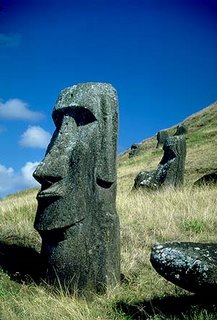 "The flesh of your mother sticks between my teeth."
"The flesh of your mother sticks between my teeth."When the Europeans arrived on Easter Island this was the most inflammatory local taunt, reflecting a change in diet forced upon the natives by deforestation. No trees meant no birds and no seagoing canoes to seek out porpoise and tuna. Yet rats, a pest that humans themselves had introduced, persisted. They too had done much to damage the native flora.
In Collapse Jared Diamond identifies 8 factors which made the natural environment on Easter particularly vulnerable to over-exploitation. Yet the hypothetical question of what the islanders were saying to each other as they cut down the last tree remains. Diamond offers some suggestions:
"Jobs not trees"
"Technology will solve our problems...never fear, we'll find a substitute for wood."
"We don't have proof that there aren't palms somewhere else on the Easter...we need more research...your proposed ban on logging is premature and driven by fear-mongering."
The problem must have accelerated towards the end as urgent appeals to ancestors meant that more statues had to be carved and transported, requiring more wood and more food for the labourers. The islanders' practice of cremating the dead was also fuel-intensive.
One of the trees that didn't make it is said to have been even taller relative of the 65ft high, 5ft wide Chilean Wine Palm which oozes a sweet sap which can be drunk as 'wine' or boiled down to make honey or sugar.
In 1862-3 Peruvian ships visited the island and abducted 1500 people to work in their guano mines. International pressure eventually forced them to repatriate some of the survivors, who returned with a smallpox epidemic that killed off many of those that had remained.
A globalised world where all resources are shared is as alone in space as Easter's Polynesians were in the vast Pacific. Diamond ends his chapter on this lonely island's environmental meltdown by asking how worried we ought to be about the parallels.

No comments:
Post a Comment